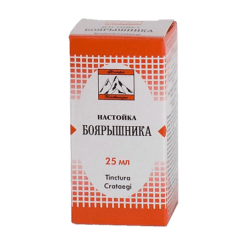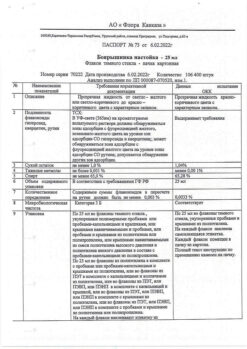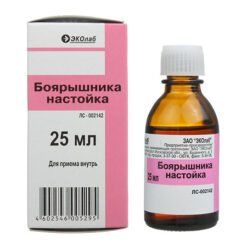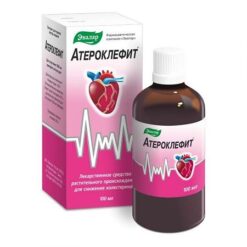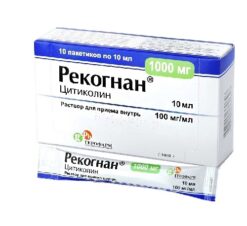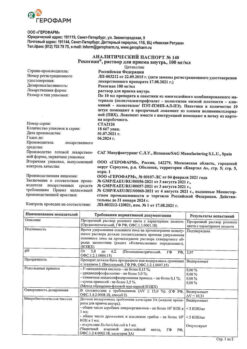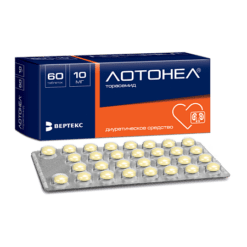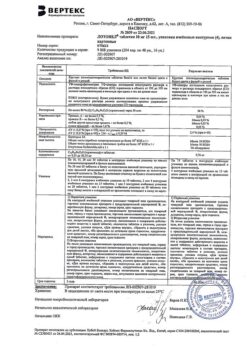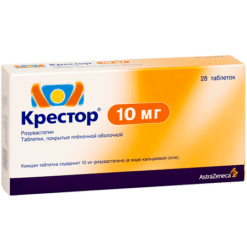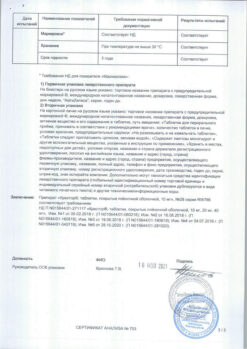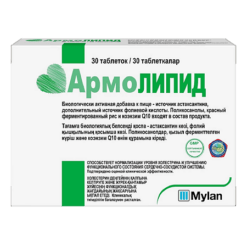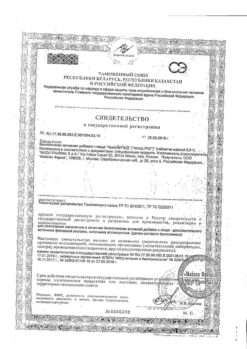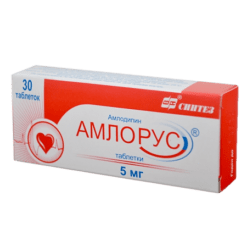No products in the cart.
Captopril STI tablets 50 mg 20 pcs.
€1.00
Out of stock
(E-mail when Stock is available)
Description
– arterial hypertension (including renovascular);
– chronic heart failure (as part of combined therapy).
Active ingredient
Active ingredient
Composition
Composition
Tablet 1 tablet captopril 50 mg
How to take, the dosage
How to take, the dosage
Captopril is prescribed one hour before meals.
In arterial hypertension, the drug is prescribed in an initial dose of 25 mg 2 times daily. If necessary, the dose is gradually (at 2-4 week intervals) increased until optimal effect is achieved. In mild to moderate arterial hypertension, the usual maintenance dose is 25 mg 2 times per day; the maximum dose is 50 mg 2 times per day. In severe arterial hypertension, the maximum dose is 50 mg 3 times/day. The maximum daily dose is 150 mg.
For treatment of chronic heart failure, captopril is prescribed in cases when the use of diuretics does not provide an adequate effect. The initial dose is 6.25 mg 2-3 times daily, which is then gradually (at intervals of at least 2 weeks) increased. The average maintenance dose is 25 mg 2-3 times daily. Further, if necessary, the dose is gradually (at intervals of at least two weeks) increased. The maximum dose is 150 mg/day.
Patients with impaired renal function: In moderate renal impairment (CKD at least 30 ml/min/1.73 m2), captopril can be prescribed in a dose of 75-100 mg/day. For more severe renal impairment (CKD
Interaction
Interaction
Diuretics and vasodilators (e.g., minoxidil) potentiate the hypotensive effect of captopril.
When concomitant use of captopril with indomethacin (and possibly with other NSAIDs) a decrease in the hypotensive effect may be observed.
The hypotensive effect of captopril may be reduced by estrogens (Na+ retention).
The hypotensive effect of captopril may be delayed when administered to patients receiving clonidine.
Simultaneous use with potassium-saving diuretics or with potassium preparations may lead to hyperkalemia.
Concomitant use of lithium salts may increase serum lithium concentrations.
The use of captopril in patients taking allopurinol or procainamide increases the risk of neutropenia and/or Stevens-Johnson syndrome.
The use of captopril in patients taking immunosuppressants (e.g., cyclophosphacin or azathioprine) increases the risk of hematological disorders.
In concomitant use of ACE inhibitors and gold drugs (sodium aurothiomalate), a symptom complex including facial hyperemia, nausea, vomiting and BP decrease has been described.
The concomitant use of insulin and oral hypoglycemic drugs increases the risk of hypoglycemia.
Special Instructions
Special Instructions
Renal function should be monitored before initiating, as well as regularly during treatment with captopril.
In chronic heart failure, the drug should be used under close medical supervision.
With extreme caution, captopril is indicated in patients with diffuse connective tissue disease or systemic vasculitis; patients receiving immunosuppressants, especially if renal function is impaired (risk of serious infections that cannot be treated with antibiotics). In these cases, the peripheral blood count should be monitored before starting captopril, every 2 weeks during the first 3 months of therapy and periodically thereafter.
The drug is used with caution during treatment with allopurinol or procainamide as well as during treatment with immunosuppressants (including azathioprine, cyclophosphamide), especially in patients with impaired renal function.
With caution it is used in patients with a history of renal disease because the risk of proteinuria increases. In these cases, the amount of protein in the urine should be monitored monthly during the first 9 months of treatment with captopril. If the urinary protein level exceeds 1 g/day, it is necessary to decide on the appropriateness of further use of the drug. Caution is used in patients with renal artery stenosis because of the risk of renal dysfunction; an increase in urea or creatinine levels in the blood may require a reduction in the dose of captopril or discontinuation of the drug.
When performing hemodialysis in patients receiving captopril, the use of high permeability dialysis membranes (including AN69) should be avoided as this increases the risk of anaphylactoid reactions.
The likelihood of arterial hypotension during treatment can be reduced by discontinuing diuretics or significantly reducing their dose 4-7 days before starting captopril treatment.
If symptomatic arterial hypotension occurs after administration of captopril, the patient should assume a horizontal position with elevated legs.
In case of severe arterial hypotension, a positive effect is noted with IV administration of isotonic sodium chloride solution.
If angioedema develops, the drug should be withdrawn and closely monitored by a physician. If the oedema is localized in the face, no specific treatment is usually required (antihistamines may be used to relieve symptoms); if it spreads to the tongue, pharynx or larynx and there is a risk of airway obstruction, epinephrine (adrenaline) should be given immediately by injection (0.5 ml given 1:1000).
Influence on driving and operating machinery
During treatment with captopril it is necessary to refrain from driving and engaging in potentially dangerous activities requiring increased concentration and rapid psychomotor reactions, because dizziness is possible, especially after the initial dose.
In patients with impaired renal function: In moderate renal function impairment (CKG at least 30 ml/min/1.73 m2), captopril can be prescribed at a dose of 75-100 mg/day. For more severe renal impairment (CKD
Contraindications
Contraindications
– history of angioedema, including hereditary, (including history of other ACE inhibitors);
– significant renal dysfunction, azotemia, hyperkalemia, bilateral renal artery stenosis or stenosis of the sole kidney with progressive azotemia, post renal transplantation condition, primary hyperaldosteronism;
– aortic orifice stenosis, mitral stenosis, other left ventricular outflow tract obstructions;
– significant liver dysfunction;
– arterial hypotension;
– cardiogenic shock;
– pregnancy and lactation;
– under 18 years of age (efficacy and safety not established).
– hypersensitivity to captopril and other ACE inhibitors.
With caution: severe autoimmune diseases (including systemic lupus erythematosus, scleroderma), suppression of medullary circulation (risk of neutropenia and agranulocytosis), cerebral ischemia, diabetes (increased risk of hyperkalemia), patients on hemodialysis, sodium-restricted diet, coronary heart disease, conditions accompanied with reduction of circulatory blood volume (including diarrhea and vomiting), advanced age.
Side effects
Side effects
Cardiovascular system: marked decrease of blood pressure, tachycardia, orthostatic hypotension, peripheral edema.
Urinary system disorders: proteinuria, impaired renal function (increased levels of urea and creatinine in the blood).
Hematopoietic system disorders: rarely – neutropenia, anemia, thrombocytopenia, agranulocytosis.
Central nervous system disorders: dizziness, headache, ataxia, paresthesia, somnolence, visual impairment, feeling of fatigue, asthenia.
Respiratory system: dry cough which resolves after discontinuation of the drug, bronchospasm, pulmonary edema.
Allergic and immunopathological reactions: angioedema of the extremities, face, lips, mucous membranes, tongue, pharynx and larynx, as well as intestinal edema (very rare), serum disease, lymphoadenopathy, in rare cases – appearance of antinuclear antibodies in blood.
Dermatological reactions: rash, usually maculopapular, less often vasicular or bullous, itching, increased photosensitivity.
Gastrointestinal tract, liver, pancreas: taste disorders, dry mouth, stomatitis, nausea, decreased appetite, rarely – diarrhea, abdominal pain, increased liver transaminases activity, hyperbilirubinemia, hepatitis.
Laboratory measures: hyperkalemia, hyponatremia, acidosis. Cases of hypoglycemia have been reported in patients with diabetes mellitus who have taken insulin and oral hypoglycemic agents.
Others: paresthesias.
Overdose
Overdose
Symptoms: marked decrease of blood pressure, up to collapse, myocardial infarction, acute cerebral circulation disorder, thromboembolic complications.
Treatment: lay the patient with the lower extremities elevated; measures aimed at restoring blood pressure (increase of the circulatory volume, including IV infusion of saline), symptomatic therapy. Hemodialysis may be used; peritoneal dialysis is ineffective.
Similarities
Similarities
Additional information
| Manufacturer | Avva Rus, Russia |
|---|---|
| Medication form | pills |
| Brand | Avva Rus |
Related products
Buy Captopril STI tablets 50 mg 20 pcs. with delivery to USA, UK, Europe and over 120 other countries.


